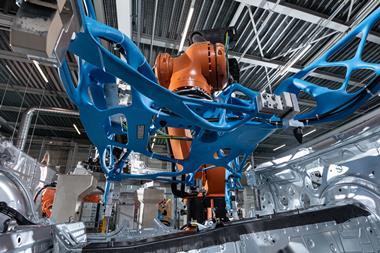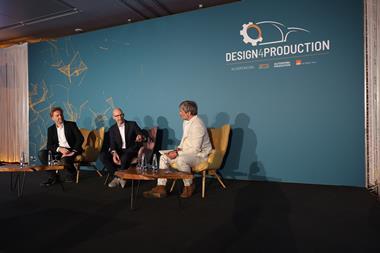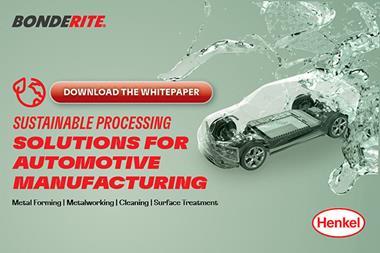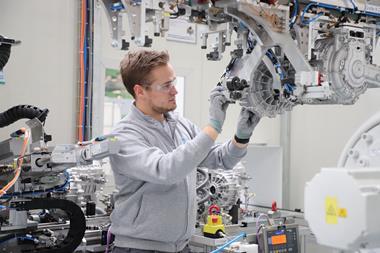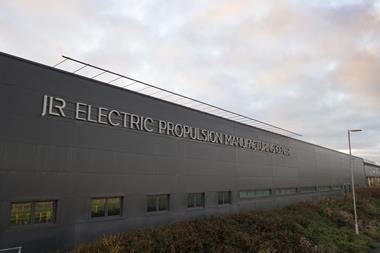Producing high quantity prismatic machined parts for the automotive industry has taken many paths over the years
 Today’s automotive manufacturing engineers appear to favour flexible manufacturing systems (FMS) or cells, as opposed to dedicated transfer lines. Typically, this is because today’s vehicle models have a shorter production life than those of yesteryear as OEMs constantly evolve their designs to try and grow market share.
Today’s automotive manufacturing engineers appear to favour flexible manufacturing systems (FMS) or cells, as opposed to dedicated transfer lines. Typically, this is because today’s vehicle models have a shorter production life than those of yesteryear as OEMs constantly evolve their designs to try and grow market share.
To ensure an FMS is as efficient and productive as possible, investment in the latest CNC machining centre technology is a prerequisite. A case in point is reported by Starrag UK, which says it has supplied another Heckert horizontal HEC 400D machining centre to the same top-tier supplier – the 14th machine onsite – to expand a manufacturing cell that produces a range of steel and aluminium suspension components.
According to Starrag, these four-axis machining centres are being used throughout the automotive sector – by OEMs and their top-tier suppliers – for the single set-up machining of workpieces such as gearboxes, coupling housings and valve bodies, and are proving effective when used in cellular or FMS configuration.
[sam_ad id=17 codes='true']
Taking a modular approachOver at German machine tool builder Heller, the school of thought extends to machine tool modularity, particularly for systems producing parts such as cylinder blocks and heads, crankshafts and camshafts, transmission and chassis components. To be able to cover such a broad range of vehicle applications, from a small two-cylinder motorcycle engine to a V12 construction machine engine, Heller opts for scalable production systems.
According to the German Automotive Association (VDA), some 78.7m passenger cars were produced worldwide in 2015, 1.7% more than the year before. In Germany alone, 5.7m vehicles rolled off the production line – an increase of almost 2%. The country’s car makers are being driven by increasingly shorter innovation cycles and growing model and variant diversity.
Manfred Maier, managing director and COO of the Heller Group explains what this means for machine tool manufacturers as suppliers to car builders: “For many companies in the automotive industry today, maximum flexibility comes before maximum productivity – with the smallest possible investment. The implementation time between the investment decision and start of production is also becoming increasingly important.”
This concept is realised with four- and five-axis modules featuring direct loading, as well as custom-made and process machines that can be interlinked at any point in time to create a fully automated manufacturing platform.

Greater complexity, less volumeThe challenges for machining are increasingly smaller batch sizes, more complex components and the integration of innovative technologies to achieve complete machining operations.
To help overcome these, Heller has a 150-employee Application Engineering (AE) department handling all of the process-related and mechanical engineering procedures for customer projects.
“The AE segment devotes 70-75% of its capacity to components that are required in the combustion engine-based powertrain,” explains Werner Roth, area manager.
“During the course of the collaboration, we not only focus on designing the machine technology and machining processes, but we also provide assistance and support for optimising the part for production, specifically with regard to material flow, workpiece clamping design, optimum handling between the machining steps and the selection of process-optimised tools. Depending on requirements, we also deliver various automation solutions.”
A specific project example is a production system for the Fiat plant in the Polish city of Bielsko-Biala. Over 1,000 two-cylinder engines roll off the production line here every day. The solution comprises three Heller MCi 25.1 machining centres, 40 MC10 machining modules with direct loading, six MCH 250 machining centres, one automated loader, statistical process control, a NOK conveyor for loading and unloading defective parts, as well as an automated parts handling facility between the individual stations.
"For many companies in the automotive industry today, maximum flexibility comes before maximum productivity" - Manfred Maier, Heller Group
As Fiat prefers cast iron rather than the current standard light alloy engines for its engine block (for reasons of strength), the intricate structure of the component presents a challenge. In addition to the prominent cylinder bores, the part is littered with flange surfaces, cooling channels and holes – all in the smallest spaces. However, some 450,000 two-cylinder engine housings are milled from G25 GH190B cast iron every year at Bielsko-Biala with a cycle time of under 40 seconds each.
“We were Fiat's key development partner for designing the production of its TwinAir engine,” emphasises Roth. And when truck manufacturer MAN was looking for a partner with adequate experience in the development of diesel engines and the machining of GGV compacted graphite iron for the housing, Heller responded in the same way (despite the difference in scale): four- and five-axis machining modules with direct loading, as well as special-purpose and process machines.
 The FMS at GW forms part of a recently opened £5m, 33,000 sq.ft, temperature-controlled machining facility
The FMS at GW forms part of a recently opened £5m, 33,000 sq.ft, temperature-controlled machining facility‘Right-sizing’ machining solutions“We will not develop a proprietary machine for every task. Instead, we will make use of a modular system,” explains Roth. “Such a machine must be designed for series production, and must be adaptable to customer requirements. In a nutshell, we talk about ‘right-sizing’. This means that the customer gets a production solution that matches their specific application.”
So, what happens when series production is not quite the volume normally associated with automotive contracts? Well, it appears the solution is rather similar, as highlighted at UK-based Grainger & Worrall (GW), a provider of machined engine castings to high-performance manufacturers including Porsche, Aston Martin, Bugatti and McLaren.
As part of an initiative to further expand its small series automotive machining capabilities, GW has installed a £1.5m turnkey FMS.
Designed specifically for high-end automotive components, such as body-in-white structures and powertrain parts, the FMS houses three Mazak Variaxis i-600 five-axis machining centres. GW says that this enhanced manufacturing capability enables shorter turnaround times and lower inventories, which are required by low-volume vehicle manufacturers.
The Variaxis i-600 is a fully simultaneous five-axis vertical machining centre that performs multiple and complex curved surface machining on small and medium-sized workpieces in single set-ups. The machine falls within Mazak's ‘Done in One’ concept by incorporating all processes from raw material input through to final machining on a single machine platform.
The machine also offers high levels of productivity via 12,000 rpm, high-rigidity spindles that are said to handle applications from heavy-duty cutting to high-speed machining of aluminium and other non-ferrous materials. An optional two-pallet changer provides continuous machine operation and integration within a Palletech manufacturing system for automated manufacturing, as is the case at GW.
“The 20-pallet system allows fixtures to remain set, so that feeding the three i-600 five-axis machining centres is both efficient and repeatable,” says Edward Grainger, director at GW. “This solution offers good flexibility to cater for changing demands while giving total process control, good levels of reliability and high part accuracy.”
The FMS at GW forms part of a recently opened £5m machining facility. The 33,000 sq.ft, temperature-controlled machining facility includes seven vertical, two five-axis and six horizontal machining centres. Shortly before its official opening, Aston Martin confirmed GW as its preferred partner to produce aluminium engine blocks and heads for the DB11.
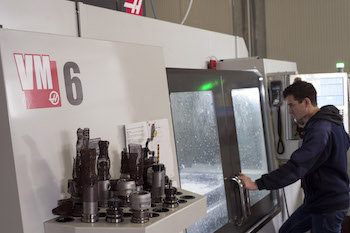 Chiaro Macchine Speciali has recently installed a Haas VM-6
Chiaro Macchine Speciali has recently installed a Haas VM-6Based near Turin, Italy, privately owned specialist-engineering company, Chiaro Macchine Speciali, is well located to serve established automotive tier suppliers such as Magneti Marelli and Webasto. In fact, 80% of the company’s engineered products, test systems, and tooling – used in manufacturing processes and on production lines – are supplied to the European and global automotive sector. Andrea Beltramo and his colleague, Khalid Mahmood, are the Chiaro engineers responsible for the company’s Haas CNC machine tools, among which is a recently installed VM-6. “We bought the machine because we wanted a large, solid machine for milling operations,” says Mahmood.
“Furthermore, it’s precise and versatile. We don’t make parts in large numbers; most of the test systems and machines we build are one-offs, but we do need versatility. The machine’s table, with its X and Y T-slots, gives us the ability to quickly and easily mount parts of different sizes and shapes.” “We do all our planning and design in-house,” adds Beltramo, “so it’s important – for speed and quality control – that we can make our own parts, test them, and make changes as quickly and efficiently as possible.”
A typical Chiaro test system could be, for example, one designed to check fabricated automotive exhausts before they are fitted to vehicles on the production line. “We’ve just designed and built a fully automated machine that allows our customer to check the silencer of an exhaust system for leaks,” says Beltramo. “It will be located beside a production line, so it has to be designed to minimise the possibility of set-up errors and, importantly, has to accommodate a variety of different model variations without any trouble or delays. “Before the Haas VM-6 arrived, we already had a Haas TM-2 milling machine, which we use for small, one-off parts,” he continues.
“So, we already knew the Haas control, which meant we were able to start working the new machine without the need for much additional instruction. We did a very short course, and that was it!” “We’re happy with the VM-6,” concludes Mahmood, “and I know the company owner is, too. We got the machine we needed to be able to improve the way we make parts in-house. It has made a significant difference.”
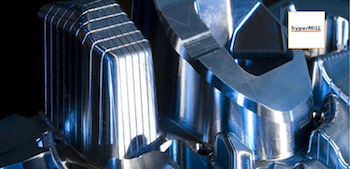 Open Mind rib machining at VW
Open Mind rib machining at VWCAM software developer Open Mind Technologies says it worked with Volkswagen’s Braunschweig plant in Germany to develop a new milling cycle for the programming of rib geometries. One of the plant’s functions is the manufacture of moulds for cylinder heads and chassis, die cast moulds for gearboxes, coupling housings and steering boxes, as well as injection moulds for bumpers and instrument panels. The cooling ribs of gearboxes have very deep cavities that entail major risk and are extremely time consuming in terms of programming and milling.
With this in mind, a specialist in-house knowledge management group made up of planning engineers, programmers and machine operators was put together to optimise the machining of ribs from die cast components. Rib types were classified and corresponding programming processes developed. On this basis, the programming approach could be standardised and the tool database adjusted accordingly. The rib milling knowledge management group developed a test part that featured all of the known degrees of difficulty, such as nesting, deep cavities, rib intersections, radial ribs and interference contours.
Based on this specification, Open Mind has subsequently developed a rib milling cycle that introduces a lot of innovations to the machining sequence, such as: an integrated roughing/ finishing function; integrated pocket machining of wide ribs; automatic collision detection of the toolholder (taking conical milling tools into account); and integrated bottom machining. The fact that the infeed parameters always come directly from the tool database, even in the case of automatically separated areas, is said to be a particular highlight. In the case of components with a very high degree of ribbing, the new approach has made it possible to significantly reduce processing times at the machine. In fact, the new rib milling cycle cut pure programming time in half.
“Further to the reductions in programming and machining times, we are also achieving greater process reliability and considerably reduced tool wear,” says Wolfgang Sofftner, contact partner for 3D machining in component tool engineering at Volkswagen’s Braunschweig plant. “The approach involves the inspection of components by knowledge management and the subsequent development of standardised machining options, and is pioneering for future projects.”





























